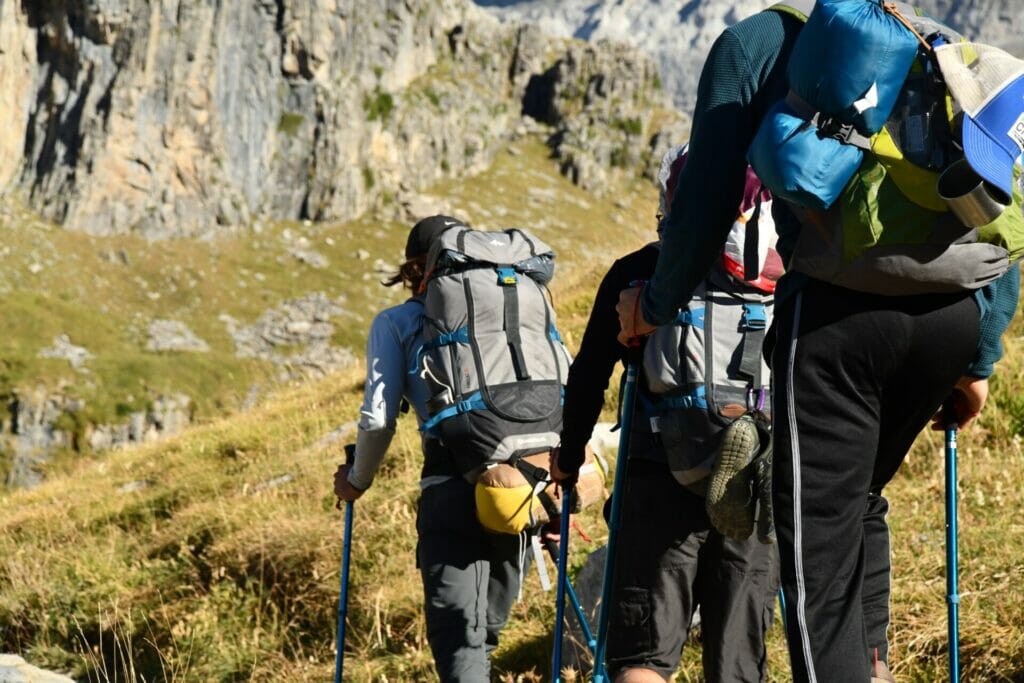Can A Beginner Hike The Appalachian Trail?
As a seasoned hiker and outdoor enthusiast, I understand the allure that the Appalachian Trail holds for beginners seeking to embark on a memorable first hike. There’s an undeniable sense of adventure and accomplishment that comes with conquering this iconic trail.
While many may enthusiastically answer “yes” to the question of whether a beginner can hike the Appalachian Trail or not, it is crucial to acknowledge the ground realities and provide the most practical and well-informed response.

I aim to offer a balanced perspective, highlighting both the allure and challenges that await those who dare to step foot on this legendary path. So, let’s delve into the realities of hiking the Appalachian Trail for beginners and discover the best approach to ensure a safe and fulfilling journey.
How Fast Can You Hike The Appalachian Trail?
Can A Beginner Hike The Appalachian Trail?
I want to be completely transparent with you—I am not here to demotivate you from conquering the world’s most iconic trail, the Appalachian Trail. Quite the opposite, I encourage you to pursue this extraordinary adventure with determination and passion.
However, it is my responsibility, to be honest and forthright about the challenges that lie ahead. The Appalachian Trail is no ordinary hike; it demands physical fitness, mental resilience, and careful preparation. If you have your heart set on hiking the Appalachian Trail, then I have some invaluable advice to offer.
Hike With Someone Close
Hiking with your closest buddy or someone you know well brings an array of benefits to your Appalachian Trail adventure. From emotional support to shared responsibilities and increased safety, this companionship enriches the journey in numerous ways.

Hiking with the closest buddy or someone you know well is one of the best decisions you make for your Appalachian Trail journey. The experience of hiking together fosters a sense of camaraderie and mutual support that can enhance the overall enjoyment and safety of the adventure.
First and foremost, sharing this experience with a close friend or someone you know well brings an added level of comfort and familiarity. It creates a supportive environment where you can freely share your thoughts, fears, and triumphs along the trail. The presence of a trusted companion is reassuring during challenging moments, boosting your morale and motivating you to persevere.
Is The Appalachian Trail Dangerous? Should We Hike It Or Not?
Having a hiking buddy also means you can rely on each other for practical help. Tasks such as setting up camp, cooking meals, and navigating the trail become more manageable with an extra pair of hands. Two heads are better than one when it comes to decision-making, which can be invaluable on a trail as vast and diverse as the Appalachian Trail.

Hiking with someone you know well deepens your bond and creates lasting memories. The shared experiences, laughter, and moments of wonder in nature will forge a unique connection between you and your hiking companion. These cherished memories will stay with you long after you’ve completed the trail.
Safety is paramount on the Appalachian Trail, and having a buddy by your side enhances it significantly. In case of emergencies or unexpected situations, you can rely on each other for immediate assistance and support. Together, you can watch out for each other’s well-being and make informed decisions to ensure a secure journey.
However, it’s essential to choose your hiking partner wisely. Select someone who shares your enthusiasm for the trail, has a similar fitness level, and is committed to the journey. Open communication about goals, expectations, and any concerns beforehand can help ensure a harmonious and enjoyable hiking experience.
Physical Fitness
When it comes to preparing for a hiking adventure, I will not stress enough the importance of physical workouts and conditioning. As someone who has experienced the consequences of being inadequately prepared for a hike, I can attest to the significant impact it can have on the overall experience.

Hiking, especially on trails like the Appalachian Trail, demands a level of physical fitness that goes beyond regular daily activities. The rugged terrain, steep inclines, and long distances put immense strain on your muscles, joints, and cardiovascular system. Without proper physical preparation, every step becomes a struggle, and what should be an exhilarating journey can quickly turn into an arduous and disheartening ordeal.
The consequences of being unprepared physically for hiking can range from simple discomfort to potential injury. As I faced the challenge without adequate workouts, I found myself fatigued and breathless within the first few miles. My legs ached, and my body felt drained. Instead of enjoying the breathtaking scenery and the thrill of exploration, my focus was entirely on trying to endure the physical strain.
How Long Does It Take To Hike The Appalachian?
The risk of injury also becomes more pronounced when your body is not adequately conditioned for the demands of hiking. The likelihood of sprains, strains, and even more severe injuries increases when muscles and joints are not accustomed to the repetitive movements and stress of hiking.

To avoid these consequences, it is crucial to engage in a consistent and well-rounded physical workout regimen before setting foot on the trail. Focus on building strength, endurance, and flexibility through activities like hiking on local trails, running, cycling, strength training, and yoga. Gradually increase the intensity and duration of your workouts to mimic the demands of hiking.
Also paying attention to proper nutrition and hydration is essential for optimizing your physical performance on the trail. Fuel your body with nutritious foods and stay hydrated to maintain energy levels and aid in recovery.
Can You Hike The Appalachian Trail Without Camping?
Set Realistic Goals
When I embarked on my Appalachian Trail journey, I was filled with excitement and enthusiasm, eager to conquer the trail and achieve impressive daily mileage from the very start. However, I quickly learned the importance of setting realistic daily goals that aligned with my fitness level and pace.
In the initial days, fueled by adrenaline and the desire to make progress, I pushed myself to cover long distances without considering the toll it might take on my body. The first day seemed like a triumph as I surpassed my expectations, but the next morning, I woke up feeling sore and exhausted.

It was a humbling experience to realize that hiking the Appalachian Trail required careful pacing and listening to my body’s cues. Over time, I learned to set more practical daily mileage targets that allowed me to enjoy the journey while gradually building my endurance.
By adopting a more measured approach, I found myself relishing the scenic beauty and serenity of the trail, rather than solely focusing on reaching a specific distance each day. It was liberating to understand that the trail was not just about the destination but the incredible experiences along the way.
Setting realistic daily mileage goals enabled me to avoid burnout and injuries, ensuring I could sustain my hiking journey over the long haul. It gave me the freedom to take breaks, appreciate detours to stunning viewpoints, and engage with fellow hikers without feeling rushed.

As a hiker, I learned to trust myself and respect my limitations. I embraced the philosophy that the Appalachian Trail is not a race but a transformative adventure. Each day became a chance to grow physically and mentally, cherishing every step and discovering my own rhythm on this incredible path.
Ultimately, I came to appreciate the journey’s essence and the beauty of setting realistic daily goals. It taught me to listen to my body, relish the present moment, and find joy in every mile covered. So, if you’re embarking on your own Appalachian Trail adventure, remember to pace yourself, set achievable daily mileage goals, and savor the priceless experiences that this iconic trail has to offer.
Is It Safe To Hike The Appalachian Trail Alone?
Respect Fellow Hikers
Respecting fellow hikers and the natural environment is not just an important aspect of hiking the Appalachian Trail; it is a fundamental principle that shapes the trail’s unique sense of community.
During my journey on the trail, I witnessed firsthand the power of this shared respect among hikers. The trail becomes a place of camaraderie, where strangers become friends united by a common passion for nature and exploration. Every encounter with fellow hikers presents an opportunity to connect, exchange stories, and offer support.

Respecting others on the trail goes beyond just being courteous and polite; it involves being considerate of each individual’s journey. Some may hike at a faster pace, while others take a more leisurely approach. Embracing this diversity allows us to celebrate the beauty of our varied experiences and perspectives.
It is crucial not to be over-efficient or focused solely on impressing others. The Appalachian Trail is not a competition, but a shared expedition of personal growth and appreciation for nature’s wonders. Striving to impress can lead to overlooking the essence of the journey – the chance to be in harmony with the environment, to reflect, and to find a sense of peace and fulfillment.
Respecting the natural environment is equally essential. The trail’s beauty lies in its pristine landscapes, and preserving this beauty is our collective responsibility. Following Leave No Trace principles ensures that we minimize our impact on the environment, leaving it as untouched and magnificent as we found it. Treating every campsite, water source, and trail with care preserves the Appalachian Trail for future generations to enjoy.

As a hiker, I found immense satisfaction in fostering a sense of community along the trail. I relished the shared moments, the laughter, and the support we offered one another. Embracing a mindset of respect and humility allowed me to forge genuine connections and create lasting memories with fellow hikers.
Can You Hike The Appalachian Trail in 3 Months?
Carrying A Camera
Carrying a camera with me on my Appalachian Trail journey was one of the best decisions I made. It allowed me to capture the breathtaking landscapes, the triumphs of conquering challenging sections, and the cherished moments shared with my hiking companion. Each click of the camera became a tangible memory, freezing those fleeting moments in time that I could revisit and relive whenever I wanted.

As I snapped photos along the trail, I found myself more attuned to the natural beauty surrounding me. The camera served as a reminder to pause, appreciate, and immerse myself in the sights, sounds, and scents of the wilderness. It transformed my hike into a visual storytelling adventure, where every photo encapsulated a unique experience and emotion.
Moreover, keeping a journal complimented the photographs perfectly. Writing down my thoughts, reflections, and encounters along the trail allowed me to process the journey on a deeper level. It became a personal chronicle of my growth as a hiker and the lessons I learned along the way.
Looking back at my journal entries and photos after completing the Appalachian Trail filled me with an overwhelming sense of accomplishment and nostalgia. It was like revisiting a chapter of my life, rekindling the feelings of triumph over challenges, the camaraderie with fellow hikers, and the awe-inspiring beauty of nature.
Google Photos’ yearly reminders added an extra touch of sentimentality. Seeing those photos resurface, even years after the hike, brought back waves of fond memories. It was a delightful reminder of the incredible journey I undertook and the person I was during that time.
Can You Hike The Appalachian Trail With No Money?
Selection Of Seasons
As a fellow hiker who has learned valuable lessons through personal experiences, I cannot stress enough the importance of researching the best time of year to hike the Appalachian Trail. While the allure of witnessing Appalachian beauty under a blanket of snow may be tempting, especially for a beginner, it is crucial to be realistic and prioritize good weather conditions for a safe and enjoyable hike.

Based on my experiences and insights, the ideal time to embark on the Appalachian Trail as a beginner is during the spring or fall seasons. Spring, typically from late March to early June, offers milder temperatures, blooming wildflowers, and the gradual return of greenery, making it a vibrant and pleasant time to hike. During the fall, from late September to early November, hikers are treated to stunning foliage as the leaves change colors, creating a breathtaking backdrop for the journey.
Hiking during these seasons provides more predictable weather conditions, reducing the likelihood of extreme heat or cold, which can be particularly challenging for beginners. Navigating the trail without the added complexities of snow or icy terrain is beneficial for hikers who may still be adapting to the physical demands of long-distance trekking.
Therefore, my heartfelt advice to fellow beginners is to prioritize good weather conditions for a safe and enjoyable hike. Embrace the beauty of the Appalachian Trail during the spring or fall, and bask in the comfortable temperatures, blooming nature, and stunning landscapes that these seasons offer.
Can You Hike The Appalachian Trail And Stay In Hotels?
Certainly! Here’s more advice on how to select gear, packing tips, and camping essentials for your Appalachian Trail hike:
Gear Selection:
Prioritize lightweight and high-quality gear to reduce the overall weight of your backpack.
Invest in a reliable and comfortable backpack that fits well and has proper ventilation.
Choose a lightweight and durable tent or shelter that suits your needs and the trail conditions.

Opt for a sleeping bag and pad appropriate for the expected temperatures and terrains.
Select clothing made of moisture-wicking and quick-drying materials to stay comfortable on the trail.
Bring a reliable and multi-purpose camping stove for cooking meals.
Consider using a water filtration system or purification tablets to have access to safe drinking water on the trail.
Pack a compact and efficient multi-tool for various tasks.
Packing Tips:
Organize your gear into separate stuff sacks or waterproof bags to keep items easily accessible and protected.
Pack your heaviest items closer to your back and center of the backpack for better weight distribution.

Use compression sacks to minimize the volume of bulky items like sleeping bags and clothing.
Keep essential items like snacks, water, a map, and a first aid kit in easily reachable external pockets.
Always pack rain gear and warm layers, even in fair weather, as weather conditions can change rapidly on the trail.
Utilize dry bags or trash compactor bags to keep your gear dry in case of rain.
Camping Essentials:
Follow Leave No Trace principles, leaving the campsite as you found it.
Practice setting up your tent or shelter before the hike to become familiar with the process.
Choose designated camping spots whenever possible, respecting the rules and regulations of the trail.
Camp away from water sources to avoid polluting them and disturbing wildlife.
Properly store food to prevent attracting animals to your campsite.
Additional Tips:
Take the time to break in new hiking boots and ensure they fit comfortably before the hike.
Carry a comprehensive map and compass, even if you plan to use GPS or smartphone apps for navigation.
Consider using trekking poles to reduce strain on your knees and improve balance while hiking.
Bring a portable battery charger to keep your electronic devices charged on longer sections without access to electricity.
Keep a lightweight and compact book or journal to pass the time during rest breaks and document your journey.
By carefully selecting gear, mastering packing techniques, and understanding essential camping practices, you’ll be well-prepared for the challenges and adventures that await you on the Appalachian Trail. Proper preparation will help ensure that you have a safe, enjoyable, and memorable hiking experience.
Can You Hike The Appalachian Trail In The Winter: Things To Know Before Heading Out


